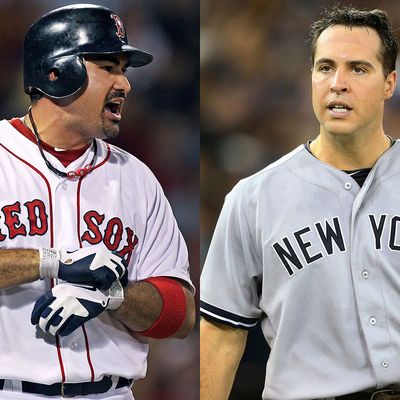
It says something about the intensity of Yankees–Red Sox rivalry — and about how intensely we follow sports, in general — that Cold War imagery has so often and so casually been invoked over the past decade. The teams were engaged in an arms race, we’ve been told by headline writers looking for a clever way to reference the teams’ pursuits of pitching. The Yankees, as Larry Lucchino famously put it, are the “evil empire.” Bill Simmons once called it “a zero sum game for sports, a de facto Cold War — something that neither team can ever truly win.” Robert Lipsyte, in the introduction to a book on the rivalry (readable here), once wrote that, especially in the wake of the teams’ playoff appearances in 2003 and 2004, it’s “the baseball equivalent of the Cold War and the nuclear arms race between the United States and the Soviet Union.” And this weekend, in the wake of the superduperblockbuster trade between the Sox and Dodgers, The New Yorker wrote that “the Red Sox of 2012 are, in fact, quite a bit like the U.S.S.R. in 1989.” The Red Sox, according to the mag’s Sporting Scene blog, “tried to keep up financially, and intellectually” with the Yankees, but that’s over now.
This last point is an interesting one. Prior to last season, the Red Sox tried to out-Yankee the Yankees, bringing in Carl Crawford and Adrian Gonzalez. Both ended up with huge contracts, and while Boston’s Opening Day payroll this year didn’t quite approach the Yankees’, they were using similar strategies: spend boatloads of money to supplement homegrown talent. Boston had been increasingly Yankee-like in the way they operated in the years prior to that off-season, and those moves signaled their willingness to embrace the Yankees’ business model. (This is actually why the Cold War analogy was far from perfect: The teams’ philosophies weren’t drastically different all along, to say nothing of the fact that had too many actual battles during the aughts for this to be considered much of a “cold” war.)
Boston’s issues don’t all stem from December of 2010 — books will surely be written about everything that’s happened up there of late — but the Sox are starting over now. The Yankees’ great advantage has always been not just the ability to outspend every other team, but the ability to spend so much that they can absorb mistakes. And with Boston shedding payroll over the past few days, the Yankees have once again become the American League’s lone remaining superpower, if we may return to the Cold War analogy for a moment. They’re not necessarily the best team or the only good team, but no other team now operates quite the way they do. (Even the Angels, who were big spenders this past off-season, started the year with a payroll that was more than $40 million less than the Yankees.)
What happens next is unclear, though. The Yankees swear they want to cut payroll to below the $189 million tax threshold before the 2014 season. That’s still a huge payroll — high enough that we could still comfortably call them a superpower — but it could force them to rein in their spending, at least compared to what they might otherwise have done in a world without luxury taxes. It’s an even more critical moment for the Red Sox. Does the trade with the Dodgers represent a shift in organizational philosophy — that it’s not worth trying to beat the Yankees at their own game? (The Rays, by contrast, have had success, but not because they’ve kept up with the Yankees’ spending.) Or do the Red Sox take all the money they saved this weekend and simply try again to acquire high-priced megastars, if not next year, then over the next few years? (Would they consider throwing crazy money at 31-year-old Josh Hamilton to replace Gonzalez’s bat?) Or to put it another way: Has the Red Sox empire collapsed, or is it simply preparing to reload?